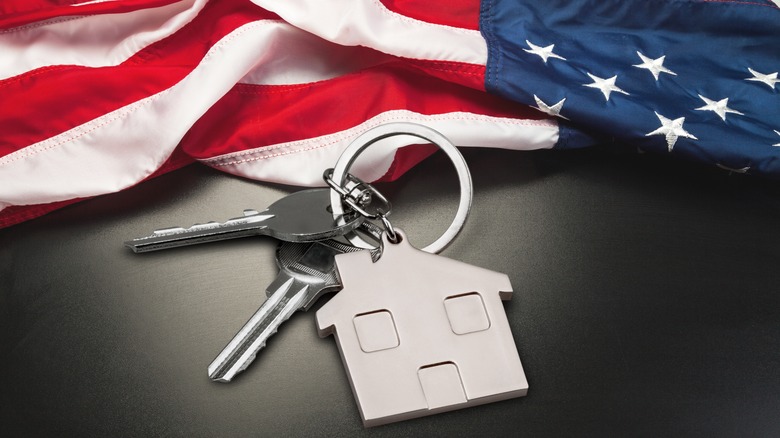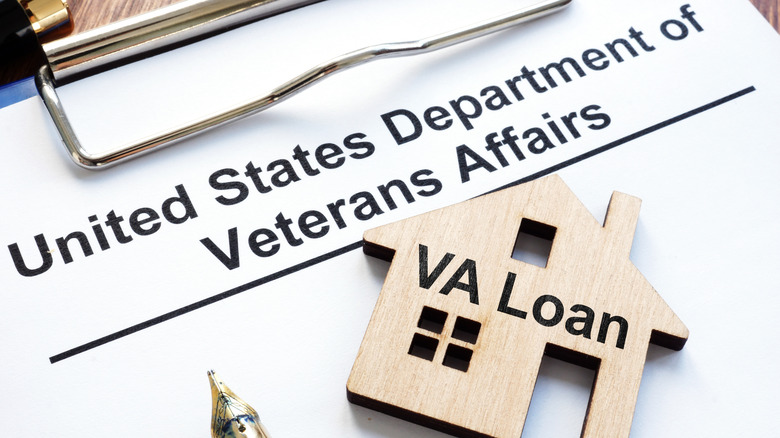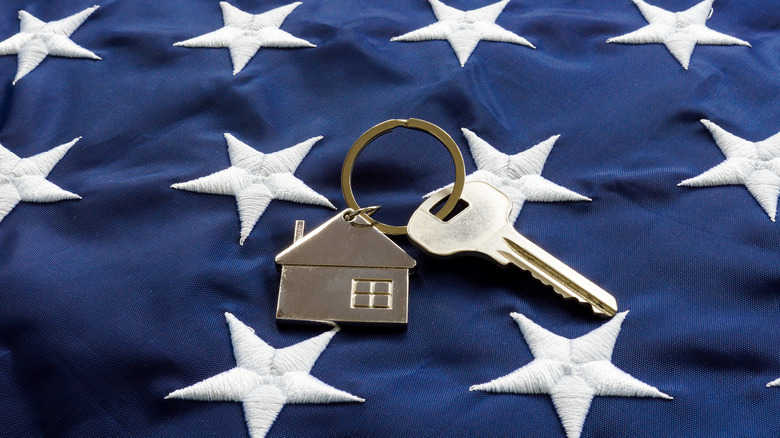What Is A VA Loan In Real Estate And Who Is Eligible For One?
Since 1930, the VA has been assisting roughly a quarter of the United States' population with various military-related benefits and services. Also known as the United States Department of Veterans Affairs, the VA provides veterans, as well as active-duty, reserve, and national guard service members and their families, with programs that include pensions, educational assistance, life insurance, and more, Scholars explains.
As claimed by the department, its vision is to provide veterans with first-rate benefits and services they deserve (via U.S. Department of Veterans Affairs). Along with its mission, the VA has four central missions that focus on health care, benefits, national cemeteries, and improving the country's preparedness for war, national emergencies, and natural disasters.
Falling under the benefits mission, the VA has been assisting prospective homeowners with home loans to ensure veterans and military members have access to housing since 1944. A term used interchangeably with home mortgages, home loans specifically apply to mortgages used to buy a house rather than a piece of property. VA home loans, in particular, help buyers purchase homes by providing a lending guarantee, as well as housing-related programs to assist with the buying and/or home building process and any repairs or adjustments that may be needed to safely and comfortably live in the home, Investopedia says.
VA home loan types and benefits
As for the different types of VA home loans, there is a direct loan and three VA-backed loans available, according to the U.S. Department of Veterans Affairs. These mortgages can help military families buy, build, or improve a new home or refinance an existing home loan. The direct loan, known as the Native American direct loan, aids eligible Native American veterans and military families with buying, building or improving a home on federal trust land. This sublet can lower interest rates and often has better terms than a loan from private lenders such as banks and mortgage companies.
The three VA-backed loans guarantee a portion of the money you receive so that there is less risk for the lenders. Purchase loans specifically assist prospective buyers with purchasing a home at competitive rates and usually don't require a down payment or private mortgage insurance. Interest rate reduction refinance loans are for those looking to make their monthly mortgage payments more manageable. Finally, cash-out refinance loans allow military families to replace their current home mortgage with another one under new terms and take cash out or refinance a non-VA loan into a loan backed by the VA.
These VA home loans additionally provide military families with limited closing costs, foreclosure avoidance assistance, and adapted housing grants for veterans with service-related disabilities (via the U.S. Department of Veterans Affairs). They also include a lifetime benefit which allows veterans and military families to use them multiple times.
Who's eligible for a VA home loan
To be considered eligible for a VA home loan, veterans and active service members must meet the department's minimum service requirements, as well as have a valid Certificate of Eligibility (COE), and fulfill the lender's credit and income requirements (via Veterans United). Dependent on your type of service, the minimum requirements vary between active-duty, national guard, and reserves.
For current and former active-duty service members, you must have served 90 consecutive days of active service during wartime and 181 days during peacetime. Guardsmen and reservists are eligible after six years of service. For veterans who are unable to meet the minimum service requirements, their home loan eligibility becomes dependent on how they were discharged from the military. However, those discharged because of personal hardship, medical condition, service-related disability, as an early out of a two-year enlistment, or at the convenience of the government, may still be eligible for a VA home mortgage.
For surviving spouses of service members who died in the line of duty or because of a service-related disability, you will also need a Certificate of Eligibility to verify your eligibility and use VA loan benefits. According to the U.S. Department of Veterans Affairs, receiving a COE as a surviving spouse also depends on whether you are currently receiving Dependency and Indemnity Compensation. You'll also need a copy of your marriage license, your spouse's death certificate, or separation paperwork.


